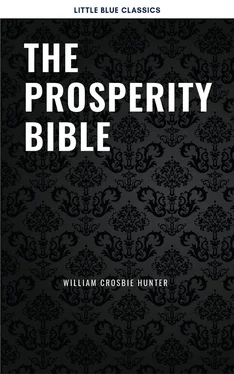One man is pleading the cause of another:
"This man, my friends, has made this wonderful sacrifice—for you and me."
Did not the pause surprisingly enhance the power of this statement? See how he gathered up reserve force and impressiveness to deliver the words "for you and me." Repeat this passage without making a pause. Did it lose in effectiveness?
Naturally enough, during a premeditated pause of this kind the mind of the speaker is concentrated on the thought to which he is about to give expression. He will not dare to allow his thoughts to wander for an instant—he will rather supremely center his thought and his emotion upon the sacrifice whose service, sweetness and divinity he is enforcing by his appeal.
Concentration , then, is the big word here—no pause without it can perfectly hit the mark.
Efficient pausing accomplishes one or all of four results:
1. Pause Enables the Mind of the Speaker to Gather His Forces Before Delivering the Final Volley
It is often dangerous to rush into battle without pausing for preparation or waiting for recruits. Consider Custer's massacre as an instance.
You can light a match by holding it beneath a lens and concentrating the sun's rays. You would not expect the match to flame if you jerked the lens back and forth quickly. Pause, and the lens gathers the heat. Your thoughts will not set fire to the minds of your hearers unless you pause to gather the force that comes by a second or two of concentration. Maple trees and gas wells are rarely tapped continually; when a stronger flow is wanted, a pause is made, nature has time to gather her reserve forces, and when the tree or the well is reopened, a stronger flow is the result.
Use the same common sense with your mind. If you would make a thought particularly effective, pause just before its utterance, concentrate your mind-energies, and then give it expression with renewed vigor. Carlyle was right: "Speak not, I passionately entreat thee, till thy thought has silently matured itself. Out of silence comes thy strength. Speech is silvern, Silence is golden; Speech is human, Silence is divine."
Silence has been called the father of speech. It should be. Too many of our public speeches have no fathers. They ramble along without pause or break. Like Tennyson's brook, they run on forever. Listen to little children, the policeman on the corner, the family conversation around the table, and see how many pauses they naturally use, for they are unconscious of effects. When we get before an audience, we throw most of our natural methods of expression to the wind, and strive after artificial effects. Get back to the methods of nature—and pause.
2. Pause Prepares the Mind of the Auditor to Receive Your Message
Herbert Spencer said that all the universe is in motion. So it is—and all perfect motion is rhythm. Part of rhythm is rest. Rest follows activity all through nature. Instances: day and night; spring—summer—autumn—winter; a period of rest between breaths; an instant of complete rest between heart beats. Pause, and give the attention-powers of your audience a rest. What you say after such a silence will then have a great deal more effect.
When your country cousins come to town, the noise of a passing car will awaken them, though it seldom affects a seasoned city dweller. By the continual passing of cars his attention-power has become deadened. In one who visits the city but seldom, attention-value is insistent. To him the noise comes after a long pause; hence its power. To you, dweller in the city, there is no pause; hence the low attention-value. After riding on a train several hours you will become so accustomed to its roar that it will lose its attention-value, unless the train should stop for a while and start again. If you attempt to listen to a clock-tick that is so far away that you can barely hear it, you will find that at times you are unable to distinguish it, but in a few moments the sound becomes distinct again. Your mind will pause for rest whether you desire it to do so or not.
The attention of your audience will act in quite the same way. Recognize this law and prepare for it—by pausing. Let it be repeated: the thought that follows a pause is much more dynamic than if no pause had occurred. What is said to you of a night will not have the same effect on your mind as if it had been uttered in the morning when your attention had been lately refreshed by the pause of sleep. We are told on the first page of the Bible that even the Creative Energy of God rested on the "seventh day." You may be sure, then, that the frail finite mind of your audience will likewise demand rest. Observe nature, study her laws, and obey them in your speaking.
3. Pause Creates Effective Suspense
Suspense is responsible for a great share of our interest in life; it will be the same with your speech. A play or a novel is often robbed of much of its interest if you know the plot beforehand. We like to keep guessing as to the outcome. The ability to create suspense is part of woman's power to hold the other sex. The circus acrobat employs this principle when he fails purposely in several attempts to perform a feat, and then achieves it. Even the deliberate manner in which he arranges the preliminaries increases our expectation—we like to be kept waiting. In the last act of the play, "Polly of the Circus," there is a circus scene in which a little dog turns a backward somersault on the back of a running pony. One night when he hesitated and had to be coaxed and worked with a long time before he would perform his feat he got a great deal more applause than when he did his trick at once. We not only like to wait but we appreciate what we wait for. If fish bite too readily the sport soon ceases to be a sport.
It is this same principle of suspense that holds you in a Sherlock Holmes story—you wait to see how the mystery is solved, and if it is solved too soon you throw down the tale unfinished. Wilkie Collins' receipt for fiction writing well applies to public speech: "Make 'em laugh; make 'em weep; make 'em wait." Above all else make them wait; if they will not do that you may be sure they will neither laugh nor weep.
Thus pause is a valuable instrument in the hands of a trained speaker to arouse and maintain suspense. We once heard Mr. Bryan say in a speech: "It was my privilege to hear"—and he paused, while the audience wondered for a second whom it was his privilege to hear—"the great evangelist"—and he paused again; we knew a little more about the man he had heard, but still wondered to which evangelist he referred; and then he concluded: "Dwight L. Moody." Mr. Bryan paused slightly again and continued: "I came to regard him"—here he paused again and held the audience in a brief moment of suspense as to how he had regarded Mr. Moody, then continued—"as the greatest preacher of his day." Let the dashes illustrate pauses and we have the following:
"It was my privilege to hear—the great evangelist—Dwight L. Moody.—I came to regard him—as the greatest preacher of his day."
The unskilled speaker would have rattled this off with neither pause nor suspense, and the sentences would have fallen flat upon the audience. It is precisely the application of these small things that makes much of the difference between the successful and the unsuccessful speaker.
4. Pausing After An Important Idea Gives it Time to Penetrate
Any Missouri farmer will tell you that a rain that falls too fast will run off into the creeks and do the crops but little good. A story is told of a country deacon praying for rain in this manner: "Lord, don't send us any chunk floater. Just give us a good old drizzle-drazzle." A speech, like a rain, will not do anybody much good if it comes too fast to soak in. The farmer's wife follows this same principle in doing her washing when she puts the clothes in water—and pauses for several hours that the water may soak in. The physician puts cocaine on your turbinates—and pauses to let it take hold before he removes them. Why do we use this principle everywhere except in the communication of ideas? If you have given the audience a big idea, pause for a second or two and let them turn it over. See what effect it has. After the smoke clears away you may have to fire another 14-inch shell on the same subject before you demolish the citadel of error that you are trying to destroy. Take time. Don't let your speech resemble those tourists who try "to do" New York in a day. They spend fifteen minutes looking at the masterpieces in the Metropolitan Museum of Arts, ten minutes in the Museum of Natural History, take a peep into the Aquarium, hurry across the Brooklyn Bridge, rush up to the Zoo, and back by Grant's Tomb—and call that "Seeing New York." If you hasten by your important points without pausing, your audience will have just about as adequate an idea of what you have tried to convey.
Читать дальше












